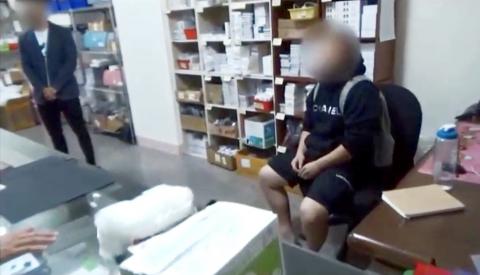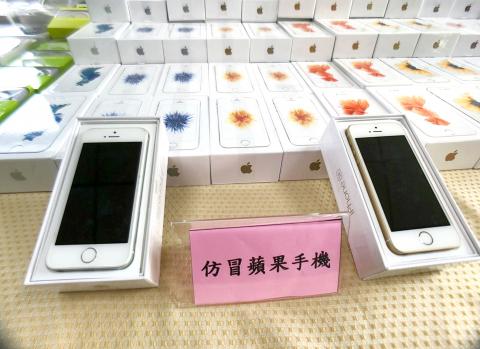Taoyuan police this week raided several locations and busted an illegal business operated by Chinese selling bogus Apple Inc iPhones.
“We busted a criminal operation that involved groups in Taiwan and China working together. They sold pirated versions of iPhones and iPhone parts,” said Lin Chih-ming (林志明), captain of the Second Police Special Corps of National Police Agency.
Police found “ more than 3,000 fake handsets and related products with an estimated value of about NT$10 million [US$324,929],” Lin said.

Photo copied by Hsu Kuo-chen, Taipei Times
Police have arrested a Chinese man surnamed Li (李), 22, and several other Chinese, along with three Taiwanese women suspected of working with the group, Lin added.
Investigators suspect that the group’s operations were based in China’s Hubei Province, as the Chinese suspects are all from Hubei, police said.
During questioning they said that they had entered Taiwan under the pretense of undergoing cosmetic surgery, which grants them a 15-day stay, police said.

Photo: Hsu Kuo-chen, Taipei Times
“We believe that this is a seasoned criminal operation, with the group’s ringleaders in Hubei, running the fake iPhone business in Taiwan. The Chinese suspects applied for visas in successive groups on the pretext of undergoing cosmetic surgery, and were replaced with another group after 15 days, when their visas ran out,” Lin said.
Police confiscated 135 iPhones and 44 Samsung handsets at a shop run by the group, along with smartphone components, which Lin said were all found to be counterfeit products made in China.
Meanwhile, police officers raiding a warehouse found a total of 3,847 assorted items, including iPhone and Samsung handsets, power adapters, earphones and other accessories, which were all found to be pirated products, Lin said.
The Chinese suspects also ran online ads to sell the fake devices and parts on auction platforms popular among Taiwanese, police said.
A accounting ledger seized by police showed that the group has made an average of about NT$2 million per month since May last year.
The group advertised the fake handsets as second-hand smartphones in good condition, demonstration kits or devices left over from special promotions, and priced them at about 10 percent off the market price, or a discount of about NT$2,000 to NT$5,000 per handset, Lin said.
Police said they have questioned all the suspects, adding that the three Taiwanese said they were hired to sell the devices and denied knowledge of the products’ origins.
The investigation is ongoing, police added.
Prosecutors said that they intend to charge the ring members with contravening the Trademark Act (商標法).

The Central Weather Administration (CWA) yesterday said it expected to issue a sea warning for Typhoon Fung-Wong tomorrow, which it said would possibly make landfall near central Taiwan. As of 2am yesterday, Fung-Wong was about 1,760km southeast of Oluanpi (鵝鑾鼻), Taiwan’s southernmost point, moving west-northwest at 26kph. It is forecast to reach Luzon in the northern Philippines by tomorrow, the CWA said. After entering the South China Sea, Typhoon Fung-Wong is likely to turn northward toward Taiwan, CWA forecaster Chang Chun-yao (張峻堯) said, adding that it would likely make landfall near central Taiwan. The CWA expects to issue a land

Taiwan’s exports soared to an all-time high of US$61.8 billion last month, surging 49.7 percent from a year earlier, as the global frenzy for artificial intelligence (AI) applications and new consumer electronics powered shipments of high-tech goods, the Ministry of Finance said yesterday. It was the first time exports had exceeded the US$60 billion mark, fueled by the global boom in AI development that has significantly boosted Taiwanese companies across the international supply chain, Department of Statistics Director-General Beatrice Tsai (蔡美娜) told a media briefing. “There is a consensus among major AI players that the upcycle is still in its early stage,”

The Central Weather Administration (CWA) yesterday said it is expected to issue a sea warning for Typhoon Fung-wong this afternoon and a land warning tomorrow. As of 1pm, the storm was about 1,070km southeast of Oluanpi (鵝鑾鼻), Taiwan’s southernmost point, and was moving west-northwest at 28 to 32kph, according to CWA data. The storm had a radius of 250km, with maximum sustained winds of 173kph and gusts reaching 209kph, the CWA added. The storm is forecast to pass near Luzon in the Philippines before entering the South China Sea and potentially turning northward toward Taiwan, the CWA said. CWA forecaster Chang Chun-yao (張峻堯) said

‘SECRETS’: While saying China would not attack during his presidency, Donald Trump declined to say how Washington would respond if Beijing were to take military action US President Donald Trump said that China would not take military action against Taiwan while he is president, as the Chinese leaders “know the consequences.” Trump made the statement during an interview on CBS’ 60 Minutes program that aired on Sunday, a few days after his meeting with Chinese President Xi Jinping (習近平) in South Korea. “He [Xi] has openly said, and his people have openly said at meetings, ‘we would never do anything while President Trump is president,’ because they know the consequences,” Trump said in the interview. However, he repeatedly declined to say exactly how Washington would respond in